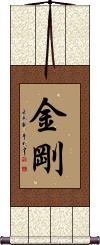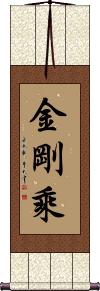Many custom options...
And formats...

Diamond in Chinese / Japanese...
Buy a Diamond calligraphy wall scroll here!
Personalize your custom “Diamond” project by clicking the button next to your favorite “Diamond” title below...
Diamond
Diamond
金剛 is a common way to call diamonds in Chinese and Japanese.
Traditionally, there were not that many diamonds that made their way to Asia, so this word does not have the deep cultural significance that it does in the west (thanks mostly to De Beers' marketing). Therefore, this word was kind of borrowed from other uses.
This title can also refer to vajra (a Sanskrit word meaning both thunderbolt and diamond that originally refers to an indestructible substance); hard metal; pupa of certain insects; Vajrapani, Buddha's warrior attendant; King Kong; adamantine; Buddhist symbol of the indestructible truth.
Stay Strong / Indestructible / Unbreakable
金剛不壞 is originally a Buddhist term for “The diamond indestructible.”
Sometimes, it's written 金剛不壞身, The diamond-indestructible body.
Outside that context, it still means firm and solid, sturdy and indestructible, unshakable, or adamantine (a mythological indestructible material).
![]() Note: If you order this from the Japanese master calligrapher, the last Kanji will look like the one shown to the right.
Note: If you order this from the Japanese master calligrapher, the last Kanji will look like the one shown to the right.
Vajrayana
Adamantine / King Kong
金剛 can translate as adamantine from Chinese, Japanese, and old Korean.
Other meanings and translations can include diamond, thunderbolt, Indra's indestructible weapon, a Buddhist symbol of the indestructible truth, Vajra (a mythical weapon), guardian deity, hardness, indestructibility, power, the least frangible of minerals.
The Chinese pronunciation of “Jīn Gāng” became the loanword used in English as “King Kong.” You can see King Kong as the indestructible ape guardian deity depending on how you read the story.
Not the results for diamond that you were looking for?
Below are some entries from our dictionary that may match your diamond search...
| Characters If shown, 2nd row is Simp. Chinese |
Pronunciation Romanization |
Simple Dictionary Definition |
金剛 金刚 see styles |
jīn gāng jin1 gang1 chin kang kongou / kongo こんごう |
More info & calligraphy: Diamond(1) vajra (indestructible substance); diamond; adamantine; (2) thunderbolt; Indra's weapon; Buddhist symbol of the indestructible truth; (p,s,g) Kongou vajra, 伐闍羅; 跋折羅 (or跋闍羅); 縛曰羅(or 縛日羅) The thunderbolt of Indra, often called the diamond club; but recent research considers it a sun symbol. The diamond, synonym of hardness, indestructibility, power, the least frangible of minerals. It is one of the saptaratna 七寶. |
金剛乘 金刚乘 see styles |
jīn gāng shèng jin1 gang1 sheng4 chin kang sheng kongō jō |
More info & calligraphy: Vajrayana |
ディアマン see styles |
diaman ディアマン |
More info & calligraphy: Dearman |
ダイアモンド see styles |
daiamondo ダイアモンド |
More info & calligraphy: Diamonde |
鑽 钻 see styles |
zuàn zuan4 tsuan san たがね |
drill; auger; diamond (1) (kana only) chisel; (2) (kana only) burin; graver; engraving tool; (3) (kana only) gad; jumper; mining tool To bore, pierce; an awl. |
両部 see styles |
ryoube / ryobe りょうべ |
(1) {Buddh} two parts; both parts; (2) both realms (i.e. the Diamond Realm and the Womb Realm); (3) (abbreviation) (See 両部神道) Shinto-Buddhist amalgamation; (surname) Ryōbe |
九會 九会 see styles |
jiǔ huì jiu3 hui4 chiu hui ku e |
(九會曼陀羅) The nine groups in the diamond-realm maṇḍala. |
亀綾 see styles |
kameaya かめあや |
(1) (See 羽二重) high-quality glossy white habutai silk; (2) raw silk twill fabric with fine diamond pattern |
五智 see styles |
wǔ zhì wu3 zhi4 wu chih gochi ごち |
(place-name, surname) Gochi The five kinds of wisdom of the 眞言宗 Shingon School. Of the six elements 六大 earth, water, fire, air (or wind), ether (or space) 曇空, and consciousness (or mind 識 ), the first five form the phenomenal world, or Garbhadhātu, the womb of all things 胎藏界, the sixth is the conscious, or perceptive, or wisdom world, the Vajradhātu 金剛界, sometimes called the Diamond realm. The two realms are not originally apart, but one, and there is no consciousness without the other five elements. The sixth element, vijñāna, is further subdivided into five called the 五智 Five Wisdoms: (1) 法界體性智 dharmadhātu-prakṛti-jñāna, derived from the amala-vijñāna, or pure 識; it is the wisdom of the embodied nature of the dharmadhātu, defined as the six elements, and is associated with Vairocana 大日, in the centre, who abides in this samādhi; it also corresponds to the ether 空 element. (2) 大圓鏡智 adarśana-jñāna, the great round mirror wisdom, derived from the ālaya-vijñāna, reflecting all things; corresponds to earth, and is associated with Akṣobhya and the east. (3) 平等性智 samatā-jñāna, derived from mano-vijñāna, wisdom in regard to all things equally and universally; corresponds to fire, and is associated with Ratnasaṃbhava and the south. (4) 妙觀察智 pratyavekṣaṇa-jñāna, derived from 意識, wisdom of profound insight, or discrimination, for exposition and doubt-destruction; corresponds to water, and is associated with Amitābha and the west. (5) 成所作智 kṛtyānuṣṭhāna-jñāna, derived from the five senses, the wisdom of perfecting the double work of self-welfare and the welfare of others; corresponds to air 風 and is associated with Amoghasiddhi and the north. These five Dhyāni-Buddhas are the 五智如來. The five kinds of wisdom are the four belonging to every Buddha, of the exoteric cult, to which the esoteric cult adds the first, pure, all-refecting, universal, all-discerning, and all-perfecting. |
五輪 五轮 see styles |
wǔ lún wu3 lun2 wu lun gorin ごりん |
(1) (See オリンピック) Olympic Games; Olympics; (2) Olympic rings; (p,s,f) Gorin The five wheels, or things that turn: I. The 五體 or five members, i. e. the knees, the elbows, and the head; when all are placed on the ground it implies the utmost respect. II. The five foundations of the world. first and lowest the wheel or circle of space; above are those of wind; of water; the diamond, or earth; on these rest the nine concentric circles and eight seas. III. The esoteric sect uses the term for the 五大 five elements, earth, water, fire, wind, and space; also for the 五解脫輪 q. v. IV. The five fingers (of a Buddha). |
六喩 see styles |
liù yù liu4 yu4 liu yü rokuyu ろくゆ |
(personal name) Rokuyu The six illustrations of unreality Diamond Sutra: a dream, a phantasm, a bubble, a shadow, dew, and lightning. Also 六如. |
内野 see styles |
naitou / naito ないとう |
{baseb} (See 外野・1) infield; diamond; (surname) Naitou |
單質 单质 see styles |
dān zhì dan1 zhi4 tan chih |
simple substance (consisting purely of one element, such as diamond) |
寶生 宝生 see styles |
bǎo shēng bao3 sheng1 pao sheng hōshō |
Ratnasaṃbhava, one of the five dhyāni-buddhas, the central figure in the southern 'diamond' maṇḍala, The realm of Subhūti on his becoming Buddha. |
忿怒 see styles |
fèn nù fen4 nu4 fen nu funnu ふんぬ |
variant of 憤怒|愤怒[fen4 nu4] (n,adj-no,vs) anger; rage; resentment; indignation; exasperation Anger, angry, fierce, over-awing: a term for the 忿王 or 忿怒王 (忿怒明王) the fierce mahārājas as opponents of evil and guardians of Buddhism; one of the two bodhisattva forms, resisting evil, in contrast with the other form, manifesting goodness. There are three forms of this fierceness in the Garbhadhātu group and five in the Diamond group. |
悲智 see styles |
bēi zhì bei1 zhi4 pei chih hichi |
Pity and wisdom; the two characteristics of a bodhisattva seeking to attain perfect enlightenment and the salvation of all beings. In the esoteric sects pity is represented by the Garbadhātu or the womb treasury, while wisdom is represented by the Vajradhātu, the diamond treasury. Pity is typified by Guanyin, wisdom by Mahāsthāmaprāpta, the two associates of Amitābha. |
方塊 方块 see styles |
fāng kuài fang1 kuai4 fang k`uai fang kuai |
cube; block; square; diamond ♦ (in card games) |
智杵 see styles |
zhì chǔ zhi4 chu3 chih ch`u chih chu chisho |
The wisdom hammer, the vajra or 'diamond club'. |
月曜 see styles |
yuè yào yue4 yao4 yüeh yao getsuyou / getsuyo げつよう |
(See 月曜日) Monday Moon-shining, or Moon-effulgence; a group shown outside the Garbhadhātu group in the Diamond Court. |
木曜 see styles |
mù yào mu4 yao4 mu yao mokuyou / mokuyo もくよう |
(See 木曜日) Thursday Jupiter, one of the 九曜 nine luminaries, q. v.; on the south of the diamond hall outside the Garbhadhātu maṇḍala. |
水曜 see styles |
shuǐ yào shui3 yao4 shui yao suiyou / suiyo すいよう |
(See 水曜日) Wednesday The planet Mercury, one of the nine luminaries; it is shown south of the west door of the diamond court in the Garbhadhātu. |
滿荼 满荼 see styles |
mǎn tú man3 tu2 man t`u man tu manda |
maṇḍa, solid, the diamond throne. |
火天 see styles |
huǒ tiān huo3 tian1 huo t`ien huo tien katen |
The fire devas shown as the 12th group in the diamond court of the Garbhadhātu; v. 火神. |
火曜 see styles |
huǒ yào huo3 yao4 huo yao kayou / kayo かよう |
(See 火曜日) Tuesday; (female given name) Kayo Mars, one of the nine luminaries, shown south of the Diamond hall in the Garbhadhātu. |
碎鑽 碎钻 see styles |
suì zuàn sui4 zuan4 sui tsuan |
small diamonds; melee (small diamonds used in embellishing mountings for larger gems); splints (sharp-pointed diamond splinters); clatersal (small diamond splints from which diamond powder is produced by crushing) |
細氷 see styles |
saihyou / saihyo さいひょう |
ice crystals; diamond dust |
色石 see styles |
iroishi いろいし |
(1) (See カラーストーン) gemstones (apart from diamond, e.g. ruby, sapphire, etc.); (2) colored stone |
菱形 see styles |
líng xíng ling2 xing2 ling hsing hishigata ひしがた |
rhombus (noun - becomes adjective with の) rhombus; rhomb; diamond shape; (surname) Hishigata |
血鑽 血钻 see styles |
xuè zuàn xue4 zuan4 hsüeh tsuan |
blood diamond; conflict diamond |
金口 see styles |
jīn ko jin1 ko1 chin ko kinguchi きんぐち |
gold-colored paper wrapped around the tip of a cigarette (coloured); (surname) Kaneguchi The golden mouth of the Buddha, a reference inter alia to 金剛口 the diamond-like firmness of his doctrine. |
Click here for more diamond results from our dictionary
The following table may be helpful for those studying Chinese or Japanese...
| Title | Characters | Romaji (Romanized Japanese) | Various forms of Romanized Chinese | |
| Diamond | 戴矇德 戴蒙德 | dài méng dé dai4 meng2 de2 dai meng de daimengde | tai meng te taimengte |
|
| Diamond | 金剛 金刚 | kon gou / kongou / kon go | jīn gāng / jin1 gang1 / jin gang / jingang | chin kang / chinkang |
| Stay Strong Indestructible Unbreakable | 金剛不壞 / 金剛不壊 金刚不坏 | kon gou fu e kongoufue kon go fu e | jīn gāng bù huài jin1 gang1 bu4 huai4 jin gang bu huai jingangbuhuai | chin kang pu huai chinkangpuhuai |
| Vajrayana | 金剛乘 金刚乘 | kongou jou / kongoujou / kongo jo | jīn gāng shèng jin1 gang1 sheng4 jin gang sheng jingangsheng | chin kang sheng chinkangsheng |
| Adamantine King Kong | 金剛 金刚 | kongou / kongo | jīn gāng / jin1 gang1 / jin gang / jingang | chin kang / chinkang |
| In some entries above you will see that characters have different versions above and below a line. In these cases, the characters above the line are Traditional Chinese, while the ones below are Simplified Chinese. | ||||
Successful Chinese Character and Japanese Kanji calligraphy searches within the last few hours...







